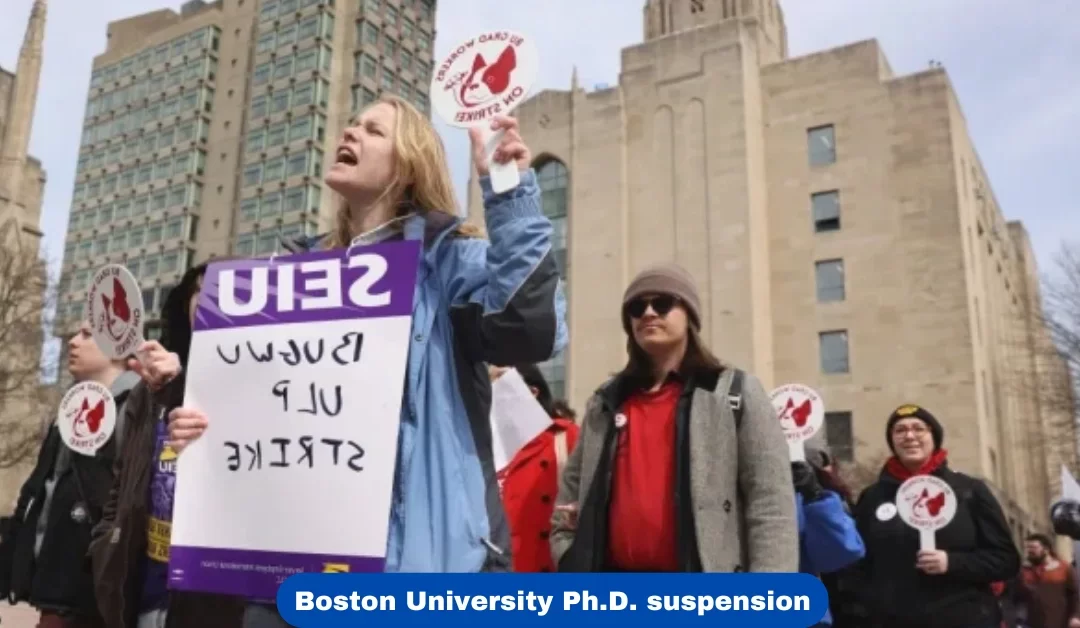Boston University (BU) recently announced a significant decision to suspend admissions for 12 Ph.D. programs in humanities and social sciences for the upcoming academic year. These include key fields like philosophy, English, sociology, history, and anthropology. While BU has framed this as part of a broader review for program sustainability, many believe the decision stems from financial pressures tied to a recently negotiated graduate workers’ union contract.
What Programs Are Affected?
The suspended Ph.D. programs include:
- Philosophy
- English
- History
- Sociology
- Anthropology
- Classical Studies
- Political Science
- Religion
This pause in admissions impacts both prospective students and faculty in these departments, leaving many uncertain about the program’s future.
Why Did BU Take This Step?
In October 2023, after a nearly seven-month strike, BU’s graduate workers successfully negotiated a historic union contract that increased wages and benefits. While this was a win for graduate students, it came with higher costs for the university. BU’s College of Arts and Sciences (CAS), which oversees these Ph.D. programs, is now tasked with absorbing the financial impact.
University administrators indicated the pause is necessary to ensure they can honor five-year funding commitments made to currently enrolled students. The provost’s office covered increased costs for this fiscal year, but CAS is expected to manage future budgets without additional support from the larger university endowment, which stands at over $3.1 billion.
Official Statement and Reactions
In a statement, BU described the decision as part of an “ongoing review” of doctoral programs aimed at ensuring their “long-term sustainability.” While the university acknowledged the importance of these disciplines, the suspension and reduced cohort sizes are seen as interim measures to stabilize finances.
The lack of transparency has fueled frustration among students and faculty. A prospective philosophy Ph.D. applicant posted about the situation on Reddit, expressing confusion and concern over receiving a rejection notice before completing their application. Current students and faculty are also left with unanswered questions about how the pause will affect research output and department stability.
Budgetary Concerns and Union Contract Implications
Emails from two deans in CAS revealed the financial strain caused by the union contract. They cited “budgetary implications” and stated that continuing with normal admissions would be financially unsustainable. The college plans to limit cohort sizes for grant-funded programs and suspend admissions for non-grant-funded ones.
Critics argue that the university’s response reflects misplaced priorities. Despite its billion-dollar endowment, BU has opted to pass the financial burden to individual colleges rather than leveraging its wealth to support academic programs. This decision has sparked broader conversations about funding for humanities and social sciences, which often face cuts in favor of STEM fields.
Broader Implications for Higher Education
BU’s decision raises questions about the future of Ph.D. programs in the humanities and social sciences, not just at this university but nationwide. These disciplines are already under pressure due to declining enrollments and limited job prospects for graduates. Pausing admissions could further weaken the pipeline of researchers and educators in these fields.
Experts in higher education emphasize the need for universities to strike a balance between financial sustainability and their mission to support a broad range of academic disciplines. Some worry that decisions like BU’s set a precedent for deprioritizing the humanities in favor of more lucrative fields.
Moving Forward: What Does This Mean for Students?
For prospective students, this pause means fewer opportunities to pursue advanced degrees in the humanities and social sciences at BU. It may also create a ripple effect, with similar programs at other universities experiencing increased competition for limited spots.
Current students in these programs face uncertainty about the future of their departments. Faculty members may need to adjust research plans, and departments may struggle to maintain their reputation without fresh cohorts of Ph.D. candidates contributing to academic output.































